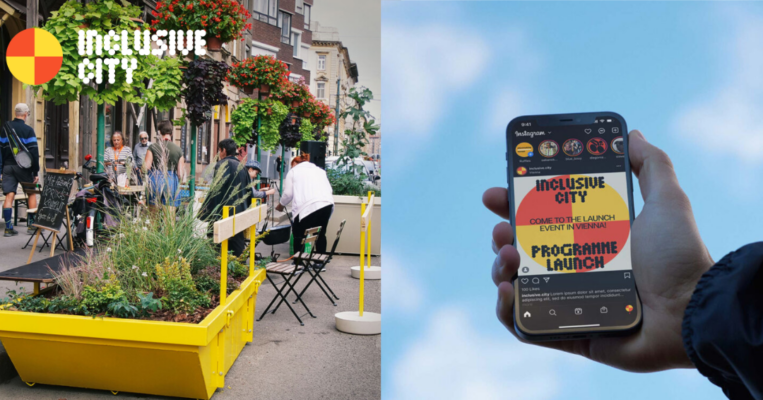RESEARCH
DUT / INCLUSIVE CITY – 2024-2026
 The INCLUSIVE CITY project aims to investigate and develop the practice of placemaking, which is increasingly used in European cities, along with the concept and principles of the 15-minute city, reinforcing the role of inclusivity in public space development. Through the project, the consortium will develop tools, methods, policy guidelines and strategies that support the creation of inclusive and accessible public spaces, taking into account social, economic and environmental impacts. The concept of a 15-minute city is an urban structure where all the services needed for everyday life are within a 15-minute walking distance. The practice of placemaking contributes to this and, through its tools, improves the quality and accessibility of local services. Placemaking is a collaborative and participatory process whereby we can shape our public spaces with the active involvement of the local community.
The INCLUSIVE CITY project aims to investigate and develop the practice of placemaking, which is increasingly used in European cities, along with the concept and principles of the 15-minute city, reinforcing the role of inclusivity in public space development. Through the project, the consortium will develop tools, methods, policy guidelines and strategies that support the creation of inclusive and accessible public spaces, taking into account social, economic and environmental impacts. The concept of a 15-minute city is an urban structure where all the services needed for everyday life are within a 15-minute walking distance. The practice of placemaking contributes to this and, through its tools, improves the quality and accessibility of local services. Placemaking is a collaborative and participatory process whereby we can shape our public spaces with the active involvement of the local community.

Five pilot projects (Urban Living Labs) will be carried out in Budapest, Oslo, Rome, Rotterdam and Vienna, one in each of the five partner countries, to test the methods and tools developed during the project. The pilot projects aim to provide practical solutions to the following problems: In Budapest, critical placemaking will be used in Népszínház Street, the city’s most multicultural street, but also one with many social challenges; in Vienna, the aim is to make the waterfront in the city centre more accessible; in Oslo, the objective is to involve young people in the development of green spaces in the city centre; in Rotterdam, the pilot project focuses on the inclusive development of the waterfront; and in Rome, the aim is to improve public spaces between the social tenement buildings of Bastogi, involving local residents. The project’s international consortium is made up of 15 partner organisations, including renowned European universities, city authorities and NGOs: decision-makers, urban planners, urbanists, academics and civil society representatives who have acquired extensive experience and knowledge in the field of urban development throughout their careers.
Project lead: Superwien Architecture and Urbanism (Vienna)
Project partners:
- Austria: Superwien, Eutropian GmbH, Social Design – University of Applied Arts Vienna
- Holland: Stichting Placemaking Europe, Breda University of Applied Sciences (BUas)
- Norway: Nabolagshager AS, Norwegian University of Science & Technology, Natural State AS, SINTEF
- Hungary: KÉK–Hungarian Contemporary Architecture Centre (KÉK), RÉV8 – Józsefváros Urban Development and Rehabilitation Company (RÉV8), Budapest University of Technology and Economics (BME), Department of Urban Planning and Design
- Italy: Nuove Ri-Generazioni Lazio, ASD Bastogi, Nonna Roma ODV
References and results:
- 15-minute city on the DUT website: https://dutpartnership.eu/the-dut-partnership/transition-pathways/
- INSTRAGRAM: https://www.instagram.com/inclusivecity_eu/
- LINKTREE: https://linktr.ee/inclusivecity_eu
- YOUTUBE INTRO: https://www.youtube.com/watch?v=BrWO0qZGeZA&t=2s
- ÉPÍTÉSZFÓRUM articles on the project (Hungarian):
- DOCONF CONFERENCE – INCLUSIVE CITY session: http://doconf.architect.bme.hu/call-for-abstracts/
